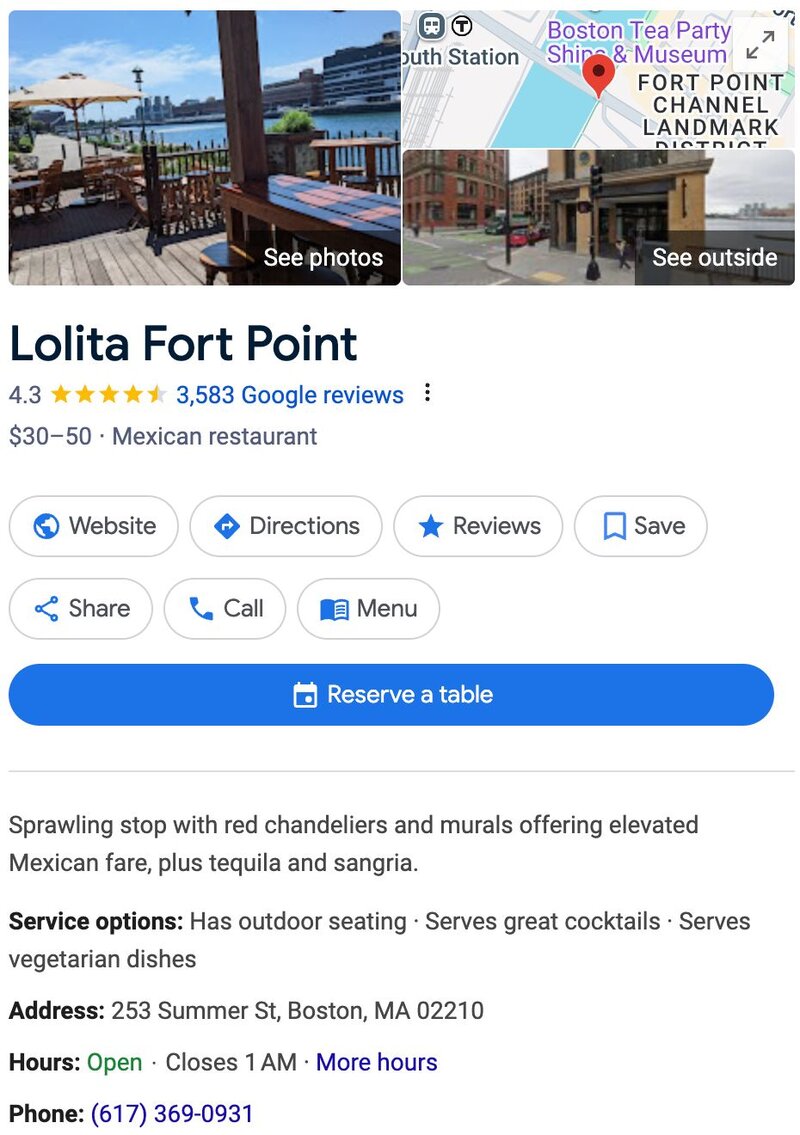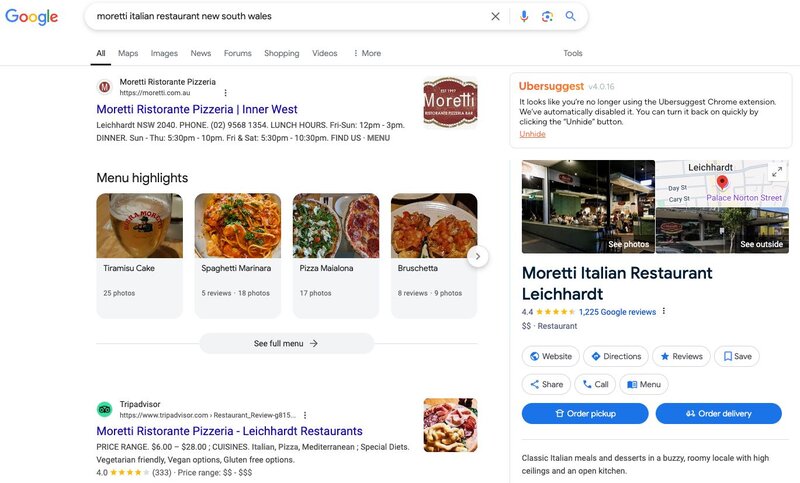4 Quick-Win Restaurant SEO Tips to Capture Holiday Diners

Katelyn Andrews
5 min read
Sep 10, 2025


Katelyn Andrews
5 min read
Sep 10, 2025

The holiday season is almost here, and for most restaurants, it’s the most anticipated, and profitable, time of the year. You've put in the hours planning seasonal menus, decking the halls and creating an atmosphere that’s perfect for festive gatherings. But without the right digital visibility, all that hard work could go unseen.
Our data shows that one in three diners turns to Google when searching for restaurant reservations, and we’d be willing to bet it’s even more than that during the holidays.
If your venue isn’t easy to find online, you could be losing potential customers and revenue.
To get your restaurant to the top of the local search results, you need to ensure your Google My Business Page (GMB) and website are optimized for search, also known as SEO (search engine optimization).
While some SEO tactics can take months to show results, we’re revealing quick, effective strategies that are easy to implement and work fast.
We spoke with Clive Morley, CEO of Serv, a restaurant marketing and SEO agency in Sydney, who shared his four quick-win tips to boost your Google rankings and drive organic traffic just in time for the holiday season.
If you run a restaurant, you likely already have a Google My Business listing, or at least you should.
Google My Business is a free, powerful tool that boosts your restaurant’s visibility to potential diners searching Google or Maps for a place to eat. A GMB profile shows information such as contact details, reviews, menus and images. And for restaurants who accept reservations, you can also add your booking link so diners can reserve a table directly.

When setting up a GMB profile, one of the first steps is to choose a primary category that best describes your business. Categories help boost your rankings for local searches for your business type and offerings (e.g., Asian restaurant). As of October 2024, there are 4,098 GMB categories.
In addition to the primary category, you can also add up to nine sub categories to give Google more information about what you offer. Clive recommends utilizing as many as you can.
“Of the 1,000+ restaurants I’ve spoken to, less than 5% take full advantage of all primary and secondary categories,” he added. “It may seem like a small detail but it’s very impactful.”
According to Clive, adding relevant secondary categories can drastically improve rankings. “I’ve seen a restaurant go from position 24 to position 3 on Google for lunch restaurant searches in a few days by simply adding ‘lunch restaurant’ as a secondary category.”
Below are some additional secondary category options you may want to consider:
Adding terms like “event venue” or takeout restaurant” can help you rank higher for takeout, catering or private event searches during the holiday season and throughout the year.
Did you know that visitors (and competitors) can suggest edits to your GMB profile? Google will alert you to these suggested edits via email but if you don’t verify or reject them, they will automatically accept the changes. This makes it crucial to regularly check your GMB listing to keep your phone number, address, hours, categories and images up to date. Don’t forget to add any special holiday hours as well!
Google rewards listings that show a lot of engagement, which indicates a restaurant is popular. Engagement is when a user clicks on your listing, looks for directions or leaves a review.
According to Clive, you can influence this.
“Typically, there are two sets of people who regularly engage with your GMB profile, staff and customers,” Clive shared. “Encourage your staff to use Google Maps for directions to your restaurant on their way to work, especially during peak hours and busy times like the holidays. For guests, encourage them to leave Google reviews.”
Send guests follow-up emails with a direct link to your GMB listing to leave a review or to look up directions for future visits.
Not only will this help drive engagement, which is a known ranking factor (e.g., anything you can do to help manipulate the results in Google), but you’ll also be pushing that positive engagement signal Google loves. The goal is to have more visitors clicking, interacting, and (hopefully) leaving positive feedback
Also, don’t forget to actively respond to the reviews; it’s a great way to boost engagement and show people that you value their input.
At SevenRooms, you can automatically send personalized ‘thank you’ and feedback request emails to diners after meals, online orders or events to capture guest reviews and encourage them to book another reservation.
Rather than linking directly to your website in email campaigns or your email signature, Clive recommends using a branded Google search link.
A branded Google search includes your business name + the product or service you want to rank for. For example, Clive’s company, Serv, is a restaurant marketing agency. Therefore, he wants his business name to be associated with “restaurant marketing agency” terms.
Creating these associations strengthens the relevance of your brand to specific search terms, ultimately improving rankings and driving more qualified traffic to your website.
To illustrate this for a restaurant, Clive created a branded search link for Moretti Ristorante that could be used in an email signature to help them improve their rankings for “italian restaurant New South Wales.” When clicked, the link brings the user to the branded Google search page featuring the restaurant’s website, GMB listing, review sites and social media pages.

“It’s a slight extra step for the user compared to sending them directly to your website,” Clive explains. “But it’s worth testing because search volume is a ranking factor. Google wants to show popular restaurants more than non-popular ones. By diners clicking this link, it not only drives up branded search volume but it strengthens Google’s association between your brand and specific keywords. In this case it’s improving the connection between ‘Moretti’ and ‘italian restaurant.’”
This time of year, both consumers and businesses are looking to celebrate with friends, family and colleagues, resulting in a higher volume of large group bookings and private events.
According to Clive, one of the most powerful ways to improve your online visibility is to create specific, holiday-themed pages on your website to help you rank for search terms like “best restaurants for holiday parties” or “corporate holiday events.” He suggests having dedicated landing pages for:
For example, the term “best restaurant for holiday party” has 170 searches/month. The top results are filtered based on the searcher’s specific location, which in this case, is Raleigh, North Carolina.
The top position after the Yelp listing is Margaux’s, a local restaurant that has a detailed, search optimized blog article dedicated to private event planning.
The article has information on holiday planning best practices, booking recommendations and fun ideas for themes.
According to Clive, “Google is going to reward more high-quality, in-depth content,” so the more descriptive and specific you can be, the better your local SEO results. “If you have a great page, which covers the content well, and answers all of your readers' FAQs, you’re naturally going to use all the right keywords and score well for comprehensiveness—another Google ranking factor.”
A blog article is one way to build out great content for local keywords, but if your website doesn’t have one, create a detailed landing page like the Meat & Wine Co in Australia. When searching for “best restaurant holiday party Sydney” their holiday event landing page was listed in the top rankings.
The landing page leaves nothing to the imagination. Every detail is covered including descriptions and images of their various dining spaces, capacity information, location details, terms and conditions and menu options.
They also include a “More Christmas Info” section at the bottom that provides additional details based on the type of holiday event you’re looking for. All the while, their “Make a Booking” button follows visitors down the page, so they can easily book a reservation when they’re ready.
Once you’ve built this template, it’s easy to replicate and customize for major holidays like Easter and Mother’s Day. If you operate in multiple regions, you can also create tailored landing pages for each market. Meat & Wine Co has a unique holiday landing page for their private dining venues in Melbourne, Perth, Adelaide and Canberra.
As Clive explains, successful restaurant SEO doesn’t have to be costly or time-consuming.
“Many restaurant owners and marketers believe that SEO strategies require a large investment or that results take months to implement and materialize. While that can be the case for certain tactics, the stuff that we’re talking about here is all free and can be done in a couple of days,” Clive shared. “The best part is that many of these tips can be applied to improve your online presence throughout the year.”
If you’re ready to build on these quick wins and develop a more comprehensive marketing strategy, consider reaching out to Clive and his team at Serv. Their expertise in restaurant marketing can help ensure your restaurant stands out this holiday season—and beyond.